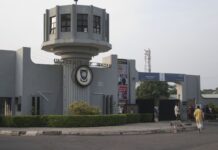
Academics converged on the University of Lagos for the first lecture series of the annual UBA Professorial Chair in Finance to chart a course of action for economic prosperity of the African continent.
The chairman of UBA professorial Chair and professor of finance at UNILAG, Prof John Ezike who led the discussion was joined by the institution’s head, department of economics, Prof. Risikat Dauda and senior lecturer, department of finance, Dr Olalekan Obademi to dissect the theme ‘The dynamic structure of world economy from globalisation to slowbalisation: The African dilemma’.
They listed a number of policy measures and strategies that would bring about far reaching results and economic turnaround of the continent.
They included instituting stable macro-economic policies, the adoption of supply-side strategies, capital market development, enhancement of banking and financial system, liberalisation of the economy, privatisation and reduced government dominance of economic management, democracy and good governance, human capital development, policy co-ordination and enabling the multilateral environment.
These polices, they said, are capable of creating a sustainable path towards the socio-cultural, economic and political development of the continent.
Ezike, in his analysis said the global economy is currently witnessing the fourth wave of revolution in civilisation, which is the movement towards de-globalisation or slowbalisation.
He stated that countries that have not benefitted from globalisation are those that fail to implement sound macroeconomic measures to maintain financial and exchange stability.
“It behoves countries in sub-Saharan Africa, therefore, to strive to adopt policies that are in consonance with the realities of the rapid integration of world economies. The world must seek for answers in a new ideology which will allow globalization to prosper faster, but prevents the rise of elitism. In point of fact, some world leaders are already of this view as they have condemned the trickle-down theory of capitalism,” the economist said.
He shed some light on how the mentioned policies can take the continent to a new level.
On stable macro-economic policies, he explained that globalisation increases the cost of macroeconomic distortions while enhancing the reward for sound policies.
“As a result, it is important that sound macroeconomic, sectorial and structural policies are applied to improve internal balance, ensure external sector viability and increase the overall rate of economic growth,” he added.
He explained that stable macroeconomic policies also ensure that the domestic economy is insulated from disruptive short term capital flows as investment savings decisions would be predicated on domestic economic fundamentals rather than market sentiments that may be unrelated to developments in the economy.
On capital market development, he said the capital market should be developed before opening it to international competition.
He noted that the gradual opening up of the capital market would help to reduce the influx of destabilizing short term capital flows which in some cases may result in economic overheating.
To avoid unintended developments, he said the capital market should be opened up gradually after adequate safeguards have been put in place and productive sectors have been strengthened.
On enhancing the banking and financial system, the academic said the banking and financial systems need to be strengthened through adequate supervisory and prudential regulations to ensure that internationalisation does not disrupt the financial sectors, precipitate macroeconomic instability and weaken the productive sectors of the economy.
Commenting of democracy and good governance, Ezike said good governance, rule of law, transparency and accountability are invaluable for a prosperous economy.
He stressed that excessive government intervention in economic management creates a fertile ground for corruption and rent seeking agencies.
“A well-focused administration geared towards reducing bottlenecks on the path of the private sector, would generate adequate impetus for the acceleration of economic growth, he concluded, saying rule of law reduces the incentives for corruption and ultimately creates an enabling environment for the efficient allocation of resources through the free interplay of market forces,” he said.
History, he said, has shown that it is difficult or near impossible to sufficiently gain sustained growth in an economy like Nigeria which is highly multi-ethnic, diverse in parts, and highly dependent on a mono-product export resource.
“At this juncture, it is safe to say Nigeria and other countries in its league, must out of necessity enthrone true federalism, in its governance and diversify its economic and export base in order to reposition the economy so as to reap the attendant benefits of dynamic world globalisation/slobalisation” he said.
For his part, the deputy vice chancellor and chairman, UBA Board of Trustees, Prof Ben Oghojafor, expressed appreciation to the bank for resuscitating the UBA Professorial Chair of Finance and the laudable support it continues to give the institution.
“It is to the credit of UBA, that the seed they planted through the first endowment has grown and is now bearing fruit. It is on record that the first endowment in 1972 facilitated the establishment of the department of finance in 1973, the first of such department in Finance in any University in Nigeria and has helped train a great number of finance graduates who have gone on to make great impacts in the country”.
“We appreciate the generosity of UBA in helping to make this colloquium a reality today and are hopeful that the bank will sustain this noble initiative for a long time to come”, Oghojafor said.
In his remarks, the group managing director of the bank, Mr. Kennedy Uzoka, said it is the bank’s passion to improve the quality of education across the continent, particularly in the 20 African countries that the bank is present.
“UBA is very proud to be associated with the endowment of professorial chair of finance in University of Lagos and it is our plan to continue to endow that chair.
“It is also our way of giving back to the society, as we will continue to sustain the initiative and many more that concern education, because it is very important to UBA and we are more than committed to providing the necessary support for the youths in Nigeria and across the African continent,” said Uzoka who was represented by the head, Micro, Small and Medium Enterprises (MSMEs), Mr. Babatunde Ajayi.
UBA had in 2015 resuscitated the UBA Professorial Chair of Finance at the UNILAG with an endowment sum of the N52.9 million with the aim of bridging the huge gap in the funding of educational system in the country.





















































